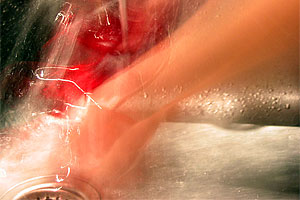 Who's more energy efficient with the dishes-- you or your dishwasher? Image: Ronan_tlvA microwave oven is the most efficient way to heat water for a cup of tea, hot chocolate, or coffee. True or False?
Who's more energy efficient with the dishes-- you or your dishwasher? Image: Ronan_tlvA microwave oven is the most efficient way to heat water for a cup of tea, hot chocolate, or coffee. True or False?
Now as a regular morning coffee drinker who uses a kettle and a gas stove to heat water for coffee (not instant-- yuk! I use a coffee filter cone and PEET's coffee, of course) instead of the microwave, since our microwave is an old piece of inefficient junk that takes forever to heat water, I thought that buying a new microwave would make me a more energy efficient coffee drinker. But I was wrong!
Jennifer Mitchell-Jackson, while a graduate student at Lawrence Berkeley National Laboratory, measured the energy use of an average microwave oven, an electric stovetop, and a gas stovetop to heat up a mug of water. Turns out that an electric stove uses 25% less electricity than an average microwave oven to heat a mug of water. A gas stove is less efficient and uses more energy than a microwave oven, but depending on the cost of gas, it might cost less to heat a mug of coffee with gas compared to the microwave.
It is more efficient to wash dishes by hand than it is to use a dishwasher. True or false?
How many arguments has that one caused! The research to dispel this myth came from Germany. Rainer Stamminger, a professor of household and appliance technology and his colleagues at the University of Bonn, gathered more than 100 volunteer dishwashers with varying skill levels and dishwashing styles in a laboratory, and measured the amount of water and energy each used to wash big stacks of dirty dishes. He then washed similar dirty dishes in dishwashers and measured the dishwashers’ water and energy use.
